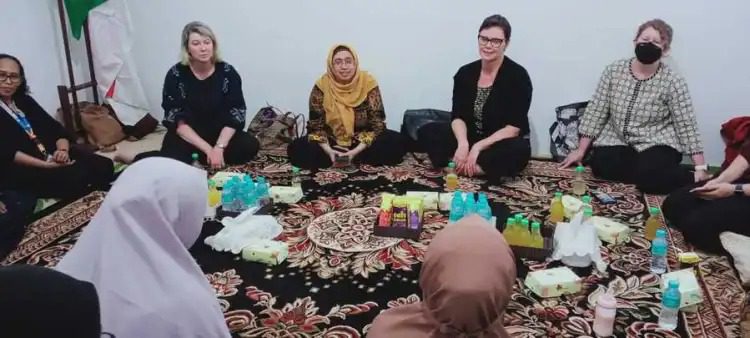MUHAMMADIYAH.OR.ID, SIDOARJO – The Australian Department of Foreign Affairs and Trade (DFAT) conducted a direct assessment of the sustainability of the Getapak (Family Food Security) program at the Assakinah ‘Aisyiyah Cooperative in Sidoarjo on Wednesday (14/6).
The Getapak program, a collaboration between the Central Board of Muhammadiyah and the Australian government, has been supporting 80% of urban residents and 20% of economically vulnerable rural residents affected by the COVID-19 pandemic since July 2020.
The program targets vulnerable groups, including those laid off, individuals who do not receive social assistance, women -particularly those with young children-pregnant and lactating women, the elderly, people with disabilities, and families with more than five members.
During the assessment, the Australian delegation included the First Assistant Secretary of the Southeast Asia Maritime Division at the Australian government Dr. Lauren Bain and the Minister of Counsellor at the Australian Embassy Ms. Madeleine Moss.
“I am here to observe the implementation of this program, assess its impact, and formulate strategies for its sustainability. It is important to ensure that the program is effectively reaching its targets. We are delighted to see that the program has been able to continue until now,” said Lauren.
Accompanied by the Muhammadiyah Disaster Management Center (MDMD) representatives, Rahmawati Husein and Budi Setiawan, the Australian delegates also met with the program beneficiaries. One of them, Nanik, shared how her husband was laid off without notice in May 2020.
Due to the Getapak program, Nanik established a successful layer poultry farming business, sustaining her family’s livelihood and covering her child’s educational expenses.
“Alhamdulillah, I got assistance from ‘Aisyiyaah, so my family can financially sustain ourselves during the COVID-19 pandemic. We are grateful for its support,” said Nanik.
“However, we still require further guidance. We no longer receive it since the program was over,” added Nanik.
As a donor institution, the representatives of the DFAT were glad that the Getapak program was on target. The challenges Nanik and her fellow beneficiaries face would be an evaluation for future programs.
“The Australian government will examine these challenges and consider recommendations of the mothers. We hope that appropriate follow-up actions can be taken,” said Lauren Bain.












Discussion about this post